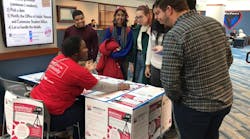Our human story has always been a narrative of progress and innovation. While in an ideal world we would always have the time and prosperity to innovate in peace and harmony, difficulty and hardship are often innovation drivers. In times of crisis, there is an urgency to solve problems and an impetus to unite, which spurs transformative thought into action.
There's no doubt we're living in times of difficulty and hardship. With the onset of COVID-19 early this year and the threat of the climate crisis looming, now is a time for transformative innovation and the persistence that comes with a clear vision for the future. At Commonwealth Edison (ComEd), one of the largest electric utilities in the United States serving over four million customers in northern Illinois, leaders are driving the transformation of both the electric grid and the social fabric of the communities that depend upon it.
ComEd has been developing Community of the Future in Bronzeville, just south of Chicago's central business district, since 2016. A multilayered initiative to address community resilience at every level, ranging from microgrid technology to science, technology, engineering, and math (STEM) programming, Community of the Future was designed to drive forward thinking. Rather than slow progression of Community of the Future projects, the pandemic has shifted the way ComEd achieves program objectives and strengthened the company's resolve for building a model of holistic community resilience. Despite unforeseen challenges, ComEd is driving innovation to help make Bronzeville into one of the greenest, most connected, most sustainable communities is the nation.
Identifying Strengths and Building Projects
From its earliest days, Community of the Future has been about empowering the residents of Bronzeville, focusing on leveraging community strengths to improve quality of life and enhance sustainability of local institutions. The project began with the Bronzeville Community Microgrid (BCM) — the first utility-operated microgrid cluster — being deployed to provide higher levels of energy resilience to Bronzeville, while demonstrating the technological innovations that allow the electric grid to be more sustainable. Once completed, the microgrid will serve approximately 1000 residences, businesses, and public institutions, including the headquarters of the Chicago Police and Fire Departments. As the flagship project for Community of the Future, the microgrid serves as an engine for these projects, but their scope and reach have extended far beyond reliable power.
From detailed community studies and informative advisory committee meetings with local stakeholders, it became clear to ComEd that an appreciation for history, particularly artistic and cultural history, are major strengths of Bronzeville. And it's no wonder, with the cast of historical figures who once claimed Bronzeville as their home, such as the musician Louis Armstrong, the Pulitzer Prize-winning poet Gwendolyn Brooks, and civil rights leader Ida B. Wells. As a historical African American metropolis, Bronzeville lives within a legacy of innovation, which brings a sense of pride to the community.
With the understanding that Community of the Future needed to honor the past of this vibrant neighborhood in efforts to innovate and connect, ComEd began development of two major art initiatives in 2019 before the pandemic hit — the Bronzeville Film Festival and the Bronzeville Renaissance Mural.Both projects were envisioned to offer homage to Bronzeville's rich and varied artistic past, while looking excitedly to a future connected "smart" community. Both projects included a STEM component, as STEM education is a hallmark of ComEd’s commitment toward progress and community development. Both projects were envisioned to take place with significant in-depth community involvement — student attended development events, unveilings, tours, award ceremonies — in short, all the in-person gatherings we took for granted before restrictions from COVID-19 became our reality in the spring of 2020.
Innovating to Create: Bronzeville Film Festival
The inaugural Bronzeville Film Festival, which ended with a virtual awards ceremony in August 2020, is a student film festival that offers young artistic filmmakers the opportunity to submit 15-minute films in a scholarship competition, competing for the chance to win US$5000 and sponsorship to an international film festival. The theme of this project encouraged young high school and college students connected to the Bronzeville community to leverage the neighborhood's unique history to meet emerging challenges, although few could have predicted the challenge of engaging in a film festival during a pandemic.
Despite this unexpected challenge, seven short documentary films were submitted by a total of 25 student filmmakers on the theme, 'Community of the Past; Community of the Future.' Young people from local schools, including Dr. Martin Luther King Jr. College Prep High School, De La Salle Institute, Perspectives/IIT Math & Science Academy, and Columbia College Chicago, embody the spirit of innovation that makes up this unique neighborhood. Students were asked to consider the history of Bronzeville juxtaposed with its future, recognizing that the road toward progress isn't a straight line and that innovation means never reaching an ultimate destination.
Although the festival and subsequent awards ceremony were moved to virtual space, the event was able to shine a far-reaching light on Bronzeville with the potential to increase community engagement in the future. The DuSable Museum of African American History, originally chosen as the venue for a planned in-person event, quickly adapted to making the events virtual. Despite the difficulties, ComEd strengthened ties in the community with local stakeholders and furthered its vision of connectedness.
Innovating to Create: Bronzeville Renaissance Mural
ComEd similarly partnered with local institutions to launch The Bronzeville Renaissance Mural. With climate-focused nonprofit Before It's Too Late, local design school Little Black Pearl, and historic Gallery Guichard, local artists Shawn Warren and Rahmaan Statik worked with ComEd to create a fusion of advanced technology, art, and community engagement. Little Black Pearl students even submitted their own works of art which were incorporated into the final version of the mural.
The mural connects to ComEd's wider Community of the Future initiative and its flagship project, the BCM, through its location, chosen specifically to highlight this connection, as the wall where the mural was installed is part of the microgrid energy storage battery. The location is meant to align with the mural message, encouraging people to pursue more sustainability and to learn more about Community of the Future as a whole, and the clean energy technologies being enabled through the BCM to improve lives.
With the onset of COVID-19 restrictions, ComEd, the muralists, and the students who assisted them had to become more creative in their approach to finish the project. Implementing social distancing measures and moving the mural unveiling and Bronzeville Art Walk appearance to a virtual event, all of the stakeholders who developed this project truly learned how to use innovation in the creation process.
The finished mural uses augmented reality (AR) to provide STEM opportunities, highlight decarbonization, and promote electrification efforts in Bronzeville. Despite all challenges, this mural was finished in the summer of 2020 and will serve as a model for stakeholder engagement and the visualization of smart, connected, resilient, and sustainable communities for years to come.
Innovating to Educate: STEM Programs
Something the film festival and the Renaissance mural had in common, besides each project's foundation in the history of Bronzeville and the Community of the Future, was the engagement of local students and the incorporation of STEM education. When it came to innovating and educating in the face of a pandemic, ComEd's STEM programs were at the helm of the swift transition to virtual learning, moving all ongoing programs and creating new programs for digital space in the spring of 2020.
ComEd STEM programs, both in-person and online, offer middle school and high school students the opportunity to engage with STEM concepts and Community of the Future projects in a kinetic, engaging, and life-changing way, strengthening the vision for connected, smart communities by investing in future leaders. One of the goals behind all of ComEd's STEM programs is to help develop the leaders of tomorrow and inspire them to solve present and future problems. The shift to virtual learning gave STEM programs the opportunity to lead by example and to innovate in the face of a crisis, shedding light on the importance of continued learning even when the format of that learning is initially unfamiliar.From March 2020 to August 2020, ComEd STEM programs have grown considerably. This growth includes holding virtual award ceremonies for programs that began in person and creating entirely new programming for students to engage in STEM from the comfort and safety of their own homes, like STEM Never Stops! and Learning from Leaders. ComEd's STEM programs are innovating to educate, a theme that applies not just to STEM program development, but to the engineering mentors who directly engage with students in each and every one of these programs.
Path of Persistence: Looking Forward
Through the lens of this unique relationship an electric utility is cultivating with a community in its service territory, ComEd’s Community of the Future is providing a glimpse into what tomorrow could hold. Electric utilities, going beyond simply providing reliable power to build a model for connected, sustainable, smart communities of the future, can play a critical role for all of civil society.
From a sector with the reach to provide power, ComEd understands that its role is not only systemically critical when it comes to infrastructure, but also socially critical. The projects, innovation, and education of Community of the Future reflect that awareness and the persistence to drive forward thinking in the face of unexpected challenges.




